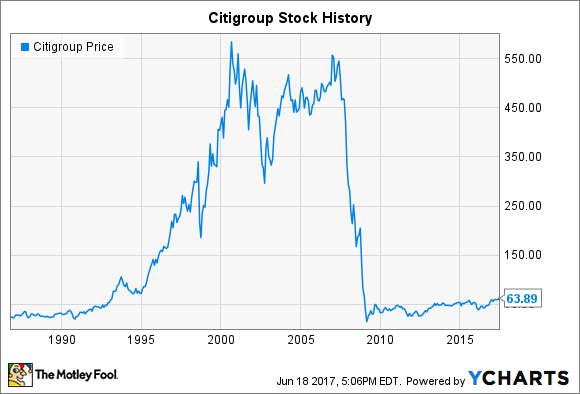Until 2007, Citigroup (NYSE:C) was among the elite financial institutions in the U.S., and its stock had delivered good returns to its longtime shareholders both from share price appreciation and from healthy dividends. Yet the end of the housing boom and the financial crisis pushed Citigroup to the edge, and the bank required government assistance in order to survive the resulting losses. Since then, Citigroup stock hasn't come close to recovering all of its lost ground in 2008, but it has nevertheless delivered good performance recently to its newer shareholders. Now, investors hope that the bank can go even further toward growing and taking advantage of more favorable financial and regulatory conditions in the industry.
How Citigroup came to be
Citigroup's roots stretch back more than 200 years, to the founding of the City Bank of New York in 1812. Since then, the bank has played an instrumental role in financing the growth engines of American industry, from the iron and steel industries in the 19th century to the infrastructure and transportation industries in the 20th century.
In the past 50 years, Citi has participated in the modernization of banking. Between developing a credit card that eventually became part of the Mastercard network and helping to popularize automated teller machines, Citi became the largest bank in the U.S. by 1990.
Citi, however, wasn't content with its status as the preeminent player in banking. It sought to become a diversified financial services giant, and its 1998 merger with Travelers (NYSE:TRV)created a company with nearly $700 billion in total assets. Although the transaction was initially not permitted under the Glass-Steagall Act, the changing political environment led to the repeal of Glass-Steagall and prevented the newly born Citigroup from having to divest any assets following the merger.

IMAGE SOURCE: CITIGROUP.
Citigroup's 21st century problems
However, Citigroup's dreams of financial dominance never fully took shape the way it had hoped. By 2002, the financial giant had seen the disadvantages of having an insurance company under its corporate umbrella, because extreme volatility in financial results stemming from catastrophic loss events had a negative impact on the entire company. As a result, Citigroup spun off Travelers in 2002, and it eventually sold its insurance underwriting businesses to other insurance companies.
For a while, the housing boom in the mid-2000s gave Citi the chance to recover from the earlier years of the new millennium. But then, the subprime mortgage crisis hit, and Citi found itself having to write off tens of billions of dollars in bad loans as a result. Massive layoffs and plans to sell more than $400 billion in assets turned out to be overly ambitious, and in the end, the U.S. government took a massive stake in the bank in order to help it stave off catastrophe.
How Citigroup rebounded
Over the past eight years, Citigroup has made considerable progress. By the end of 2010, the U.S. Treasury had sold off all of its stock in the bank, freeing it from the hassles of government ownership. More recently, Citi managed to wrap up its Citi Holdings subsidiary, into which it had put the poorly performing "toxic" assets from the financial crisis.
Having come so close to destruction, Citigroup has seen its stock soar from its March 2009 lows. Yet the gains haven't really outpaced those of its main big-bank competitors, and because of the extent of its losses during the financial crisis, Citi stock is still far below where it traded during most of the 2000s before the crisis hit.
Looking ahead, Citigroup has more work to do in order to regain its former status as the nation's biggest bank, and many believe that's unlikely ever to happen. Nevertheless, for Citi just to exist after the beating it took in the late 2000s is a testament to its strength -- and to the willingness of the nation to stand behind with the financial support it so badly needed in its biggest time of crisis.
10 stocks we like better than Citigroup
When investing geniuses David and Tom Gardner have a stock tip, it can pay to listen. After all, the newsletter they have run for over a decade, Motley Fool Stock Advisor, has tripled the market.*
David and Tom just revealed what they believe are the ten best stocks for investors to buy right now... and Citigroup wasn't one of them! That's right -- they think these 10 stocks are even better buys.
















